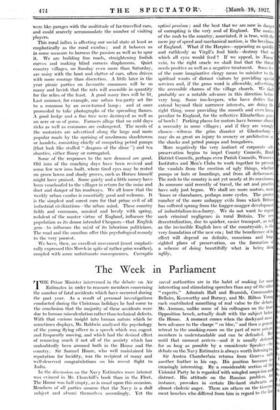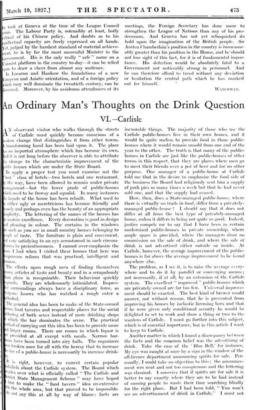The Week in Parliament
rI 1IIE Prime Minister intervened in the debate on Air 1. Estimates in order to reassure members concerning the number of fatal accidents which have occurred during the past year. As a result of personal investigations conducted during the Christmas holidays he had come to the conclusion that the majority of these accidents were due to human miscalculation rather than technical defects. With that curious insight into human nature which he sometimes displays, Mr. Baldwin analysed the psychology of the young flying officer in a speech which was cogent and frequently moving, and which had the desired effect of removing much if not all of the anxiety Which has undoubtedly been aroused both in . the House and the country. Sir Samuel Hoare, who well maintained his reputation for lucidity, was the recipient of many and well-deserved congratulations on his recent flight to India.
In the discussion on the Navy Estimates more interest was evinced in Mr. Churchill's book than in the Fleet. The House was half empty, as is usual upon this occasion. Members of all parties assume that the Navy is a dull subject and absent themselves accordingly. Yet the naval authorities are in the habit of making far molt interesting and stimulating speeches than any of the othe " experts." Admirals Hall and Beamish, Commanden Bellairs, lienworthy and Burney, and Mr. Hilton Young each contributed something of real value to the debate. Mr. Ammon, unlike some of his colleagues on the front Opposition bench, actually dealt with the subject before the House. A moment comes- when the dockyard mem- bers advance -to the charge " en bloc," and then a genera! retreat to the smoking-room on the part of mere private members is understandable and can be defended. Bu until that moment arrives—and it is usually defer for _ as long -as possible by a' considerate • Speaker—the debate on the Navy Estimates is always worth listening to Sir Austen Chamberlain returns from Geneva wit another feather in his cap. His position becomes creasingly interesting. By- a considerable section of th Unionist Party he is regarded'with mingled suspicion an distrust. His attitude on the Russian problem, f° instance, provokes in certain Die-hard stalwarts a almost choleric anger. There are others on the Covert ment benches who differed from him in regard to the ha le took at Geneva at the time of the. League Council • isis. The Labour Party is, ostensibly at least, hotly. itical of his Chinese policy. And doubts as to his ntellectual capacity are freely expressed on all hands. et, judged by the harshest standard of material achieve- wilt, he is by far the most successful Minister in the 'overnment. His is the only really " safe " name on a monist platform in the country to-day—it can be relied ,port to draw a cheer from almost any audience. In Locarno and Hankow the foundations of a new iropean and Asiatic orientation, and of a foreign policy hick may well dominate the twentieth century, can be iseemed. Moreover, by, his assiduous attendances at its meetings, the Foreign Secretary has done more to strengthen the League of Nations than any of his pre- decessors. And Geneva has not yet relinquished its hold upon the imagination of the British people. Sir Austen Chamberlain's position in the country is immeasur- ably greater than his position in the House, and he should not lose sight of this fact, for it is of fundamental impor- tance. His defection would be absolutely fatal to a Government not noticeably strong in personnel. And he can therefore afford to tread without any deviation or hesitation the central path which he has marked out for himself.
WATC1111A































































 Previous page
Previous page